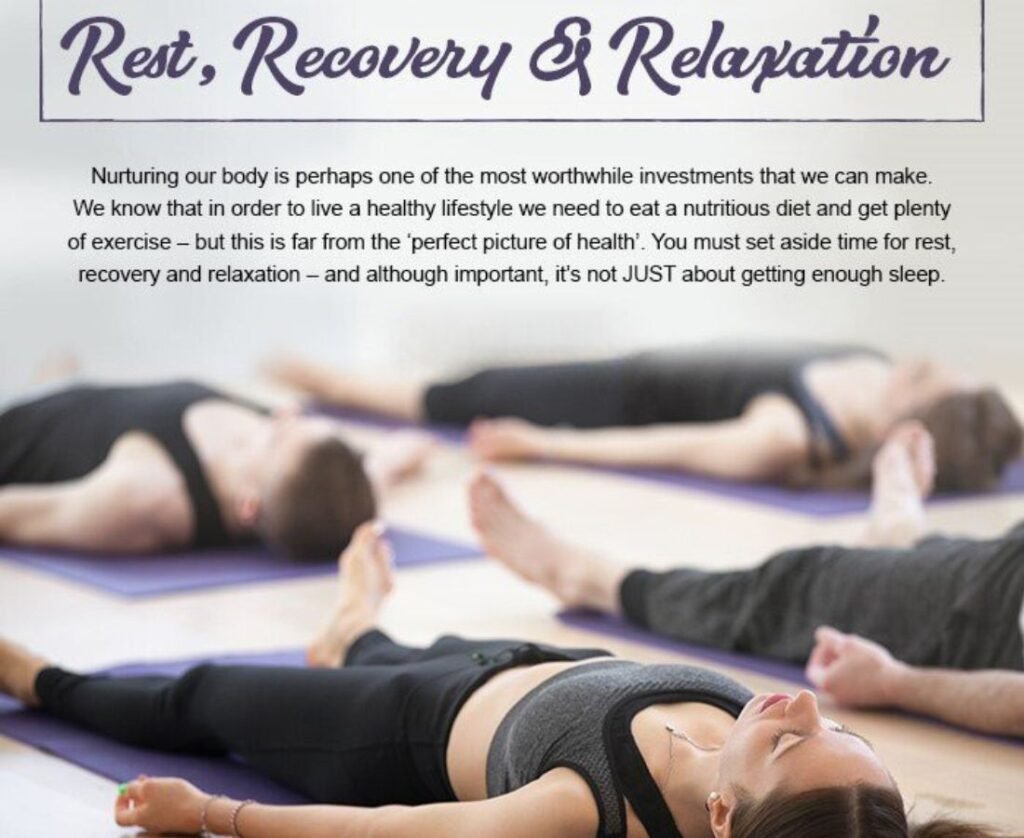Living a healthy lifestyle encompasses various essential factors such as fitness, nutrition, mindset, and recovery. These components play a crucial role in overall well-being and optimal physical health. Here are some key insights from the search results:
- Fitness: Regular exercise is vital for maintaining good health. Strength training, in particular, helps in getting stronger, leaner, and healthier5.
- Nutrition: Eating well is essential for muscle recovery and overall fitness. Consuming the right nutrients post-workout can aid in muscle recovery and glycogen replenishment2.
- Mindset: Having a positive mindset is important for motivation and consistency in maintaining a healthy lifestyle1.
- Recovery: Proper rest and recovery are crucial for optimizing health goals. Active recovery methods can promote increased blood flow, reduce lactic acid build-up, and enhance muscle flexibility
A Healthy Lifestyle: The Importance of Fitness Recovery
In the pursuit of physical fitness, many individuals focus intently on exercise routines, nutrition plans, and performance goals. While these aspects are undoubtedly crucial, one often overlooked component of a holistic approach to fitness is recovery. Fitness recovery encompasses various practices and techniques aimed at allowing the body to recuperate and adapt after periods of physical exertion. Recognizing the significance of recovery is essential for achieving optimal health and performance. Let’s delve into the concept of fitness recovery and explore its numerous benefits.
Defining Fitness Recovery
Fitness recovery refers to the processes through which the body restores itself following exercise or physical activity. It involves allowing muscles, tissues, and other physiological systems to recover from stress and strain induced by workouts. Recovery is not merely about resting; it encompasses a range of strategies aimed at optimizing the body’s ability to repair and rebuild itself. These strategies may include adequate sleep, proper nutrition, hydration, stretching, foam rolling, massage therapy, and active recovery exercises.
Benefits of Fitness Recovery
- Improved Muscle Repair and Growth: During exercise, muscle fibers undergo microscopic damage, leading to muscle soreness and fatigue. Adequate recovery allows these fibers to repair and rebuild, resulting in increased muscle strength and size. By prioritizing recovery, individuals can optimize their muscle-building potential and enhance their overall athletic performance.
- Reduced Risk of Injury: Overtraining and insufficient recovery increase the risk of injury due to muscle imbalances, fatigue, and compromised biomechanics. Proper recovery practices help prevent overuse injuries by allowing muscles, tendons, and ligaments to adapt and strengthen adequately. By incorporating recovery into their fitness routine, individuals can mitigate the risk of injuries and sustain long-term physical health.
- Enhanced Mental Well-Being: Exercise has numerous mental health benefits, including stress reduction and mood enhancement. However, excessive training without adequate recovery can lead to burnout, fatigue, and feelings of anxiety or depression. Prioritizing recovery allows individuals to maintain a healthy balance between physical exertion and mental relaxation, promoting overall well-being and resilience.
- Better Sleep Quality: Quality sleep is essential for muscle repair, hormone regulation, and overall recovery. Physical activity can improve sleep quality, but intense or late-night workouts may disrupt sleep patterns if not followed by proper recovery practices. By establishing a consistent sleep routine and incorporating relaxation techniques before bedtime, individuals can optimize their sleep quality and enhance their recovery processes.
- Increased Energy Levels: Adequate recovery ensures that the body’s energy stores, such as glycogen in muscles and the liver, are replenished after exercise. Additionally, recovery allows for the removal of metabolic by-products, such as lactic acid, which can contribute to feelings of fatigue and muscle soreness. By prioritizing recovery, individuals can maintain higher energy levels throughout the day, enabling them to perform better both in their workouts and daily activities.
Must Read: Brain Tumors: Innovations in Diagnosis and Treatment
Incorporating Recovery into Your Fitness Routine

To reap the benefits of fitness recovery, it’s essential to consistently incorporate recovery strategies into your fitness routine. Here are some practical tips to enhance recovery:
- Prioritize Rest Days: Schedule regular rest days into your workout routine to allow your body to recover and rejuvenate.
- Listen to your body: Pay attention to signs of fatigue, soreness, or decreased performance, and adjust your training intensity or volume accordingly.
- Hydrate and Nourish: Stay adequately hydrated and consume a balanced diet rich in nutrients to support muscle repair and recovery.
- Incorporate Active Recovery: Engage in low-intensity activities such as walking, swimming, or yoga on rest days to promote blood flow and muscle relaxation.
- Practice Relaxation Techniques: Incorporate relaxation techniques such as deep breathing, meditation, or gentle stretching to reduce stress and promote recovery.
- Get Quality Sleep: Aim for 7-9 hours of quality sleep per night to support physical and mental recovery processes.
A common misconception is that working out harder is always better
A prevalent misconception often held in fitness culture is the belief that working out harder equates to better results. While it’s true that pushing one’s limits can lead to improvements in strength, endurance, and overall fitness, this mindset can also lead to detrimental consequences. Overtraining, for instance, occurs when the body is pushed beyond its capacity to recover adequately, resulting in fatigue, decreased performance, an increased risk of injury, and even burnout. Moreover, prioritizing intensity over proper form and technique can lead to improper muscle activation and imbalances, which can increase the likelihood of injury in the long term.
Sustainable progress in fitness requires a balanced approach that considers factors such as proper rest, recovery, nutrition, and individualized training plans tailored to one’s goals and capabilities. Ultimately, working out smarter, not necessarily harder, is key to achieving optimal results while minimizing the risk of setbacks.
Building a Healthy Lifestyle: Finding Balance
Amidst the chaotic rhythm of contemporary living, the pursuit of a wholesome lifestyle can often feel like an unattainable aspiration. We’re bombarded with conflicting advice, trendy diets, and exercise fads that promise quick results but rarely deliver sustainable change. However, amidst this noise, there’s a fundamental truth: building a healthy lifestyle requires finding balance, individualization, and listening to your body.
Emphasizing Individualization and Listening to Your Body
Every person is inherently unique, so what proves effective for one individual might not yield the same results for another. This is why it’s crucial to emphasize individualization when embarking on a journey toward a healthier lifestyle. Instead of blindly following generic workout plans or restrictive diets, take the time to understand your body’s unique needs, preferences, and limitations.
Listening to your body is perhaps the most important aspect of building a healthy lifestyle. Pay attention to how different foods make you feel, notice when your body needs rest, and learn to differentiate between discomfort and pain during exercise. By tuning into your body’s signals, you can make informed decisions that support your overall well-being.
Starting Slowly and Gradually Increasing Intensity
One of the biggest mistakes people make when trying to adopt a healthier lifestyle is diving in too quickly. While enthusiasm is commendable, pushing yourself too hard right out of the gate can lead to burnout, injury, or disillusionment. Instead, start slow and gradually increase the intensity and duration of your workouts.
Whether you’re new to exercise or returning after a hiatus, remember that consistency is more important than intensity. Begin with activities that you enjoy and that feel manageable, whether it’s walking, swimming, or yoga. As your strength, endurance, and confidence grow, you can gradually challenge yourself with more demanding workouts.
Making Healthy Choices Part of Your Daily Routine

Healthy living isn’t just about hitting the gym or following a strict diet; it’s about making small, sustainable changes to your daily habits. Look for opportunities to incorporate healthy choices into your routine, such as opting to take the stairs instead of the elevator, preparing nutritious meals at home, or prioritizing sleep and hydration.
By integrating healthy habits into your daily life, you’re more likely to stick with them over the long term. Remember that consistency is key, and even small changes can add up to significant improvements in your overall health and well-being.
Managing Stress Through Relaxation Techniques
In our fast-paced world, stress is unavoidable. However, how we respond to stress can have a significant impact on our health. Instead of letting stress overwhelm you, learn to manage it through relaxation techniques such as meditation, deep breathing, or mindfulness practices.
Taking time to unwind and decompress is essential for both physical and mental health. Whether it’s spending time in nature, practicing yoga, or simply taking a few moments each day to breathe deeply and center yourself, finding effective stress management strategies can help you maintain balance in your life.
Consistency Is Key: Celebrate Small Wins
Finally, remember that building a healthy lifestyle is a journey, not a destination. It’s not about achieving perfection overnight but rather making consistent progress over time. Celebrate small wins along the way, whether it’s running your first mile, choosing a salad over fast food, or simply feeling more energized and focused.
By focusing on long-term progress and adopting a sustainable approach to fitness and healthy living, you can create lasting changes that enhance your quality of life. Remember to be patient with yourself, listen to your body, and prioritize self-care every step of the way. With dedication, perseverance, and a commitment to balance, you can build a healthier, happier life for yourself.
Summary
The article emphasizes the importance of fitness recovery as a fundamental aspect of living a healthy lifestyle. It discusses how recovery involves various practices and techniques aimed at allowing the body to recuperate and adapt after periods of physical exertion. The benefits of fitness recovery include improved muscle repair and growth, reduced risk of injury, enhanced mental well-being, better sleep quality, and increased energy levels.
The article provides practical tips for incorporating recovery strategies into one’s fitness routine, such as prioritizing rest days, listening to the body, hydrating and nourishing properly, incorporating active recovery, practicing relaxation techniques, and getting quality sleep. It also addresses the misconception that working out harder always leads to better results and emphasizes the importance of finding balance, individualization, and listening to one’s body in building a healthy lifestyle. Additionally, it suggests starting slowly and gradually increasing intensity, making healthy choices part of daily routines, managing stress through relaxation techniques, and celebrating small wins to maintain consistency in achieving long-term health and well-being goals.
For expert opinion, click here
